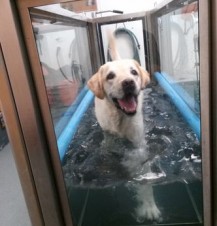Degenerative Joint Disease (Arthritis)
August 1, 2014Degenerative joint disease is the number one cause of chronic pain in dogs and cats; in fact, one in every five adult dogs is affected.
The problem isn’t just confined to older dogs; hip dysplasia, ruptured cruciate ligaments, patella luxation, joint trauma, and other joint conditions can cause degenerative arthritis, even in young dogs. Large-breed dogs are affected more often than small dogs; and dogs that are overweight are more likely to experience symptoms because of the extra strain placed on ligaments and joints.
Diagnosis
How do you know if it’s arthritis? Your dog can’t explain what’s wrong with him, so it’s important to watch his non-verbal cues closely and take even subtle changes seriously.
Signs that your pet may have arthritis:
- Favoring a limb
- Difficulty sitting or standing
- Sleeping more
- Seeming to have stiff or sore joints
- Hesitancy to jump, run or climb stairs
- Weight gain
- Decreased activity or less interest in play
- Attitude or behavior changes
- Being less alert
- Whimpering or increased vocalization
- Cats may have difficulty climbing into the litter box and may subsequently urinate or defecate in inappropriate areas
If your pet seems to have any of these symptoms we recommend making an appointment for an evaluation, which will involve a thorough physical exam and possibly further diagnostics such as X-rays. The best thing to do for your pet in managing their arthritis is to get a diagnosis and start a treatment plan as soon as possible.
Treatment:
Degeneration of the joint cannot be reversed and treatment focuses on preventing progression and relieving discomfort. Numerous treatment modalities are available, and it has been shown that arthritis pain is best addressed when several approaches are combined rather than using any single therapy alone. Each pet is different, and in those pets that are suffering from chronic pain, the following modalities will be discussed in detail with your veterinarian to create a tailored approach that best suits you and your pets’ needs.
Treatment modalities include:
Healthy diet and moderate exercise to help maintain proper weight.
Non-steroidal anti-inflammatory drugs (NSAIDS): this is the most common form of pharmaceutical treatment for arthritis in dogs. These medications help to decrease inflammation in the joint and prevent further damage.
Joint supplements containing glucosamine and chondroitin sulfate, or Omega fatty acids. Both have shown to help relieve the symptoms of arthritis in dogs. There are many products available, and formulations include pills, powders, liquids, treats, or even prescription diets that contain these supplements.
Adequan is an injectable product that can be used to prevent the cartilage of the joint from further wearing away. It soothes and lubricates the joint, and decreases inflammation and pain by reducing friction. Over time, this injection can also help to rebuild cartilage in the damaged joint.
Alternative therapies including acupuncture, laser, and physical therapy can be extremely beneficial in reducing joint pain and inflammation, and increasing muscle strength. Another advantage to implementing alternative medicine into your pet’s treatment plan is that it may allow you to eventually wean your pet off their medications while still maintaining their comfort.
Never give your dog human medication without checking with us first! Certain medications can be toxic to dogs – particularly Acetaminophen (Tylenol), Naproxen (Aleve), and Ibuprofen (Advil, Motrin) – and a safe dose will differ between a Great Dane and a Poodle. It also may inhibit which medications we may be able to use to treat your pet.
If you have any further questions about this topic, or any concerns about your pet, please don’t hesitate to call us at Chase Farm Veterinary Hospital (508) 995-9935.
Not a client here? That’s ok! We are always happy to add new members to our Chase Farm family. Please call if you are interested in scheduling an appointment, and we would be happy to accommodate you and your pets’ needs as best we can. If you would like a complimentary hospital tour before, or at the time of your appointment, one of our friendly receptionists are always happy to show you around.
Posted in General

Leave a Reply